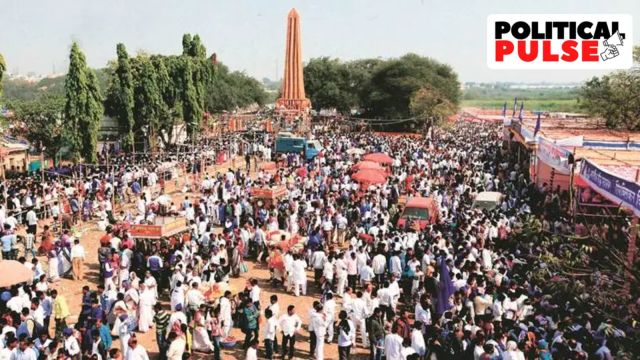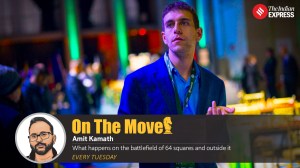Vikas Pathak is deputy associate editor with The Indian Express and writes on national politics. He has over 17 years of experience, and has worked earlier with The Hindustan Times and The Hindu, among other publications. He has covered the national BJP, some key central ministries and Parliament for years, and has covered the 2009 and 2019 Lok Sabha polls and many state assembly polls. He has interviewed many Union ministers and Chief Ministers. Vikas has taught as a full-time faculty member at Asian College of Journalism, Chennai; Symbiosis International University, Pune; Jio Institute, Navi Mumbai; and as a guest professor at Indian Institute of Mass Communication, New Delhi. Vikas has authored a book, Contesting Nationalisms: Hinduism, Secularism and Untouchability in Colonial Punjab (Primus, 2018), which has been widely reviewed by top academic journals and leading newspapers. He did his PhD, M Phil and MA from JNU, New Delhi, was Student of the Year (2005-06) at ACJ and gold medalist from University Rajasthan College in Jaipur in graduation. He has been invited to top academic institutions like JNU, St Stephen’s College, Delhi, and IIT Delhi as a guest speaker/panellist. ... Read More
Alternative reading of Bhima Koregaon: How a Maharashtra outfit is trying to advance Dalit cause from Hindutva orbit
While Dalit activism is generally understood as resistance to “Brahmanical Hinduism”, the Vivek Vichar Manch’s goal is to foster Hindu unity, something which is also a core ideological goal of the BJP and the Sangh
 While Dalit activism is generally understood as resistance to “Brahmanical Hinduism”, the Vivek Vichar Manch’s goal is to foster Hindu sentiments among Dalits, harmonise caste differences, and target Dalit activism critical of Hinduism and Hindutva.
While Dalit activism is generally understood as resistance to “Brahmanical Hinduism”, the Vivek Vichar Manch’s goal is to foster Hindu sentiments among Dalits, harmonise caste differences, and target Dalit activism critical of Hinduism and Hindutva. At a time when the Opposition, particularly the Congress, has made caste census, the representation of marginalised classes in structures of power, and their share in welfare benefits its key political planks, a recent initiative of Dalits subscribing to Hindutva and seeking to resolve caste faultlines is active in Maharashtra, with some support from the RSS and the BJP.
BJP national spokesperson Guru Prakash Paswan released a book last weekend in New Delhi on the battle of Bhima Koregaon, the turning point of the third Anglo-Maratha war that was fought near Pune on January 1, 1818. Paswan commended its author, Rohan Jamadar Madwalkar, who claims to be a seventh-generation descendant of a participant in the battle, for “bringing out evidence” to counter the narrative that the battle marked a defeat of the Brahmin Peshwas at the hands of Dalit Mahars. Two portraits graced the occasion, one of Dr B R Ambedkar and the other of Chhatrapati Shivaji Maharaj.
Paswan praised an organisation called the Vivek Vichar Manch that is promoting the book to send across a message of social unity rather than caste divide. “Today, there is an industry trying to divide society in the name of Dalits. Who has given these people the contracts? Will Harvard, Oxford, and Cambridge now decide the reality of Bhima Koregaon? Repeated attempts are made to separate Dalits from the matrix of Hindutva,” he said at the April 26 event.
Last year, after the BJP suffered a setback in Maharashrtra in the Lok Sabha elections, the Vivek Vichar Manch organised meetings across districts in the state to counter the narrative that the Narendra Modi government intended to change the Constitution.
The BJP saw this narrative as one of the primary reasons for its Lok Sabha reversals, including in Maharashtra. As the state headed towards the Assembly polls later in the year, the Manch held Samajik Samvad Sammelans (social dialogue programmes) as part of the drive and invited local leaders of the Dalit communities with an eye on reversing the Constitution-in-danger narrative.
The organisation was born as a response to the Bhima Koregaon violence in 2018 on the 200th anniversary of the East India Company’s victory over the Maratha confederacy, something that several Dalit outfits mark as the victory of Dalits over Brahminism represented by the Peshwas.
The Manch also met the two-member commission that investigated the Bhima Koregaon violence, which, it believes, was provoked by the “Urban Naxals” who instigated Dalits a day before the riots erupted.
Now, the organisation is promoting Madwalkar’s book, which argues that multiple castes, and not just the Mahars, fought for the British at the battle. “On the side of the British were Marathas, Rajputs, Brahmins, Sikhs, and Meenas. On the side of the Marathas were Arabs and Gosavis. This is there in archival documents,” said Madwalkar.
The priorities of the Manch are clear. “Samrasta (harmony), samata (equality), and bandhu-bhaav (fraternity) are part of our ideology,” Sagar Shinde, the organisation’s Maharashtra coordinator, told The Indian Express. The Manch also has a clear idea of who its adversaries are: Maoists and their urban supporters, whom Shinde calls “Urban Naxals”, and Waman Meshram’s BAMCEF (Backward and Minority Communities Employees Federation) that is an organisation of government employees from Dalit, Adivasi, backward class, and minority communities.
“We can see that BAMCEF has connections with Khalistanis and PFI (Popular Front of India) too. They spread conspiracy theories against Brahmins and try to divide Hindu society and culture,” said Shinde.
While Dalit activism is generally understood as resistance to “Brahmanical Hinduism”, the Vivek Vichar Manch’s goal is to foster Hindu sentiments among Dalits, harmonise caste differences, and take on “divisive forces” critical of Hinduism and Hindutva. This dovetails with the BJP and the Sangh Parivar’s core ideological goal of achieving “Hindu unity”, or the creation of a social coalition where support from the upper castes is complemented by subaltern Hindutva, a term coined by political scientist Sajjan Kumar, and the fulfilment of demands of the backward classes, Dalits, and Adivasis for greater representation.
Shinde admitted that the organisation, whose president is former BJP MP Pradeep Trimbak Rawat, was “ideologically close” to the BJP. “We take up issues of atrocities against Dalits. We stand with Dalits, provide legal help, and also pursue the matter with the police. We are Hindutvavwadi by ideology and the BJP is in power. So, we can fast-track justice for Dalits,” he said, adding that the RSS’s work was also “positive” and it also believes in harmony.
“While handling issues related to human rights, whenever required, we do activism against the government, irrespective of the party in power,” he added.
The Manch has links to the Maharashtra government leadership. In June 2023, then Maharashtra CM Eknath Shinde attended a social-justice conference that the outfit had organised. The Manch also hands out social justice awards and launched a campaign in Maharashtra last year for government-aided cremation grounds where people from across castes can be cremated. Dalits usually face problems with cremation as they do not have land.



- 01
- 02
- 03
- 04
- 05





























